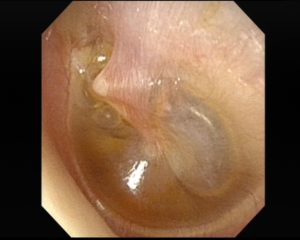My ears are blocked!
Blocked ears are a common problem that we often see in our clinic. There are a variety of reasons why someone may suffer from blocked ears. Some of these are fairly benign such as ear wax impaction but some of them may be due to a more serious cause such as sudden sensorineural hearing loss.
Most often patients come to us when their ears are blocked after swimming. This is due to the effect of water on a wax. The wax expands and blocks the ear canal.
Many general practitioners or family physicians will offer syringing for wax. This is a simple procedure where a small jet of water is directed into the ear canal to flush out ear wax. Whilst this is effective in a majority of cases, it is sometimes unsuccessful. In addition, patients with signs of an ear infection in addition to blockage, such as pain or discharge should not have syringing performed
In The ENT Clinic, wax removal is performed using microsuction. A surgical microscope and fine suction catheters allows us to remove all wax accurately.
Another common cause of ear blockage is fluid in the middle ear as a result of pressure changes sustained during flights or diving. This is called otitic barotrauma. Often the patient has a cold when they fly or dive which prevents adequate equalisation of pressure in the middle ear.

Left ear showing fluid in the middle ear. The presence of air bubbles suggests that prognosis is good
The fluid in the middle ear may take several days to clear. Often the use of decongestants and the Valsalva manoeuvre helps. In some circumstances, surgical drainage of the fluid after making an incision in the ear drum (myringotomy). A ventilation tube may then be inserted to keep the hole open and ventilate the middle ear. This tube is called a grommet.
The third and less common cause of sudden ear blockage is sudden sensorineural hearing loss. This is a medical emergency and treatment should be sort within 72 hours of onset. There is sometimes ringing or tinnitus associated with this condition.
Share this blog via:
